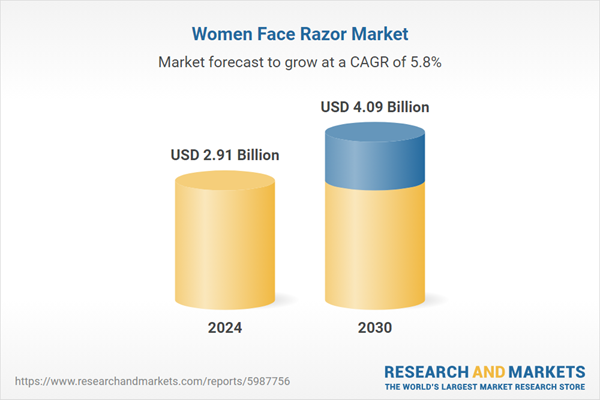Online is the fastest growing segment, North America is the largest market globally
Speak directly to the analyst to clarify any post sales queries you may have.
10% Free customizationThis report comes with 10% free customization, enabling you to add data that meets your specific business needs.
Key Market Drivers
The sustained growth in the Global Women Face Razor Market is largely propelled by two significant factors: the increasing emphasis on personal grooming and hygiene, and the surging popularity of dermaplaning for skin exfoliation. A heightened awareness of personal appearance and wellness has led consumers to prioritize comprehensive grooming routines, encompassing facial hair removal as a core component. This cultural shift translates into tangible market demand, as evidenced by Unilever's Personal Care division, which saw a 3.2% increase in volume sales during the first half of 2023, according to Cosmetics Design Europe in July 2023.Key Market Challenges
The pervasive competition from alternative facial hair removal methods presents a significant challenge to the growth of the Global Women Face Razor Market. Consumers are increasingly opting for methods such as waxing, threading, and laser treatments, which offer perceived benefits like longer-lasting results or reduced frequency of application compared to traditional razors. These alternatives effectively divert a considerable segment of the target demographic, thereby limiting the adoption and sales volume of women's face razors.Key Market Trends
The increasing consumer demand for sustainable and eco-friendly razors significantly shapes the Global Women Face Razor Market. Consumers are actively seeking products aligning with environmental values, driving brands to innovate in materials and packaging. A significant industry movement underscores this, as Cosmetics Europe's "Commit for Our Planet" initiative, which issued its first progress report in December 2024, saw 27 out of 29 surveyed companies commit to at least one climate goal, demonstrating a collective effort toward reducing environmental impact. This preference translates into market success for brands prioritizing responsible sourcing and production.Key Market Players Profiled:
- Sirona Hygiene Private Limited
- Shiseido Company, Limited
- Revlon Consumer Products LLC
- Edgewell Personal Care Brands, LLC
- Tweezerman International LLC
- Visage Lines Personal Care Pvt Ltd, Inc. (Bombay Shaving Company)
- Plushforher Inc.
- Sanfe (Redroom Technology Pvt. Ltd.)
- Mosaic Wellness Private Limited (BeBodywise)
- Elize Lifestyle Pvt Ltd (Carmesi)
Report Scope:
In this report, the Global Women Face Razor Market has been segmented into the following categories:By Product Type:
- Disposable
- Reusable
By Sales Channel:
- Supermarket/Hypermarket
- Specialty Stores
- Online
- Others
By Region:
- North America
- Europe
- Asia Pacific
- South America
- Middle East & Africa
Competitive Landscape
Company Profiles: Detailed analysis of the major companies present in the Global Women Face Razor Market.Available Customizations:
With the given market data, the publisher offers customizations according to a company's specific needs. The following customization options are available for the report:- Detailed analysis and profiling of additional market players (up to five).
This product will be delivered within 1-3 business days.
Table of Contents
Companies Mentioned
- Sirona Hygiene Private Limited
- Shiseido Company, Limited
- Revlon Consumer Products LLC
- Edgewell Personal Care Brands, LLC
- Tweezerman International LLC
- Visage Lines Personal Care Pvt Ltd, Inc. (Bombay Shaving Company)
- Plushforher Inc.
- Sanfe (Redroom Technology Pvt. Ltd.)
- Mosaic Wellness Private Limited (BeBodywise)
- Elize Lifestyle Pvt Ltd (Carmesi)
Table Information
| Report Attribute | Details |
|---|---|
| No. of Pages | 182 |
| Published | November 2025 |
| Forecast Period | 2024 - 2030 |
| Estimated Market Value ( USD | $ 2.91 Billion |
| Forecasted Market Value ( USD | $ 4.09 Billion |
| Compound Annual Growth Rate | 5.8% |
| Regions Covered | Global |
| No. of Companies Mentioned | 10 |









